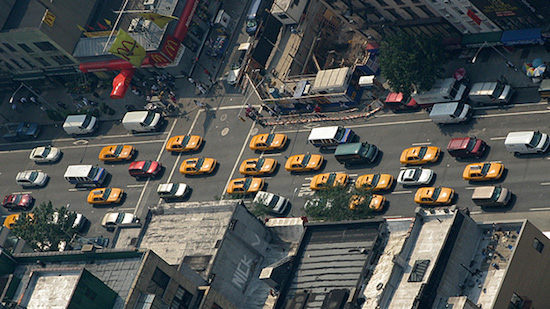
Photo by Bernard & Myrtha Garon.
By Alex Israel
Community Board 7 has come to an initial resolution regarding the latest attempt to fix the city’s transportation issue: congestion pricing.
A recent report compiled by Fix NYC, a task force implemented by Governor Cuomo to “create a dedicated funding stream to mass transit and reduce traffic on New York City streets,” outlines a set of recommendations for the city, which include:
–Implementing a zone pricing boundary, covering Manhattan south of 60th Street
–Charging a surcharge of between $2 to $5 per ride for taxis and For-Hire Vehicles (e.g. apps like Uber and Lyft)
–Charging $25.34 for trucks
–Charging $11.52 for all remaining passenger vehicles
While the report recommends a phased approach to rolling out congestion pricing beginning as soon as 2019, it provides numerous options regarding pricing on weekdays vs. weekends, and nothing official has yet materialized. As Governor Cuomo reviews their recommendation over the following months, CB7 hopes “get a seat at the table,” before any legislation comes to light.
Transportation Committee Co-Chair Andrew Albert kicked off the discussion around this issue during February’s full CB7 meeting, by acknowledging the lack of specifics contained in Fix NYC’s recommendation. “We don’t know the level of detail yet,” he said, which he suggested could “raise a number of possible issues” when it comes to how this will affect Upper West Side residents. One major issue brought up at a previous meeting is whether it will necessitate parking permits in the area, as out-of-town drivers could flood the area looking for parking so they can avoid paying the congestion fee.
With only the task force report to reference rather than a legislative proposal to react to, CB7 passed a near-unanimous resolution in approval of the overall concept of congestion pricing in Manhattan, with the primary goal of becoming “part of the process to flesh out the details of the program.”
CB7 outlined their support of congestive pricing’s ability to “raise funds for the MTA, reduce congestion, and improve air quality.” As conversations about the details develop, multiple board members cited the implementation of a similar initiative in London as a successful use case to reference. In London, however, a study found that there was little evidence that congestion pricing improved air quality and congestion has risen once again.
According to Fix NYC’s report, congestion pricing could generate around $1 billion annually for the MTA. Some board members expressed concern about where the funds will be allocated. CB7’s resolution asked for the board to have a stake in negotiations and to make sure they avoid the “black hole” of ineffective spending at the MTA, hoping to use their influence to “ensure all revenue raised by congestion pricing be dedicated solely for use by the MTA.”
While CB7 was aligned in their approval of the concept, many are not. Critics of congestion pricing echo board members’ concerns about the allocation of funds within the MTA, the enormous waste at the MTA, and the potential for increased congestion in the areas North of the pricing boundary. Lawmakers representing boroughs outside Manhattan have expressed concerns for constituents who rely on their cars due to their limited access to subways and buses. In the past, Mayor Bill de Blasio has also opposed congestion pricing—though he seems to be warming to the idea.
de Blasio appeared cautiously optimistic in response to Fix NYC’s report on a recent WNYC appearance. “This plan certainly shows improvement over previous plans we’ve seen over the years,” he said. “Definitely a step in the right direction.”



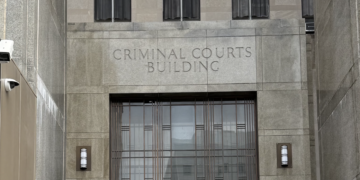
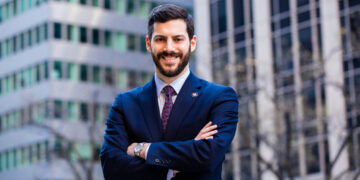


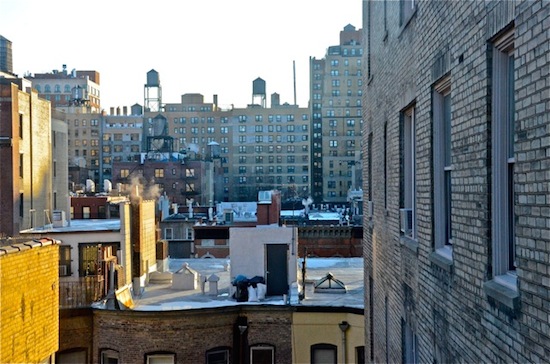
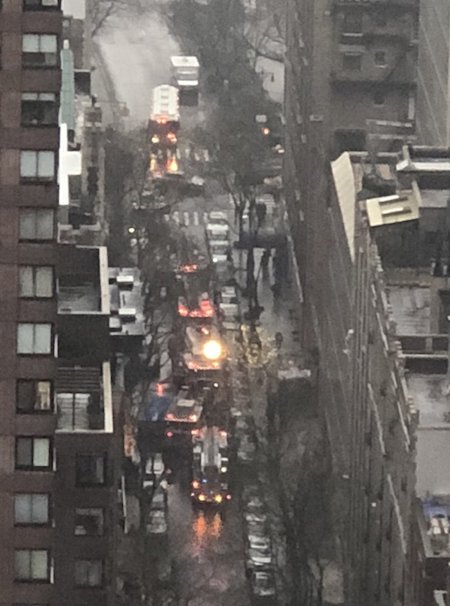
The “remaining passenger vehicle” charge – yeesh.
While parking permits is certainly something that can be gamed (auctioning your permit online?), it definitely seems like an improvement over the status quo and whatever would happen with congestion pricing.
Are there any details about how this was received at the meeting and if this is a real idea with legs? Obviously other municipalities, such as Hoboken, use this method.
It doesn’t really create free parking for residents, since there are no doubt more cars for people living in the neighborhood than spots, but it does at least align “the commons” of street parking with the residents of the neighborhood. Congestion pricing should not turn neighborhoods and communities into park and rides.
We need resident parking permits – it’s going to be so crazy with people driving around looking for parking spaces and most out-of-towners are very aggressive taking away from the residence parking. This is also a EPA issue from 125th St. down to 60th St. east and west sides.
Parking permits ftw.
Boston has resident parking permits and we should of had this 20 years ago.
I fear the traffic that will now occur on the streets just north of the 60th street border. Just dipping below 60th street will trigger the fee, which will necessitate rerouting for many drivers. My Aunt lives between 58th-59th and 9th Avenue — I am going to now have to double park on 9th and 61st and have her walk 2 blocks north when I pick her up (before driving back northwards towards riverdale)? Thats insane. Is she going to have to pay a surcharge when a taxi drops her office just 1 block below the border? Will folks near the border taking taxis/uber have to walk to 61st street to call a taxi just to avoid the surcharge?
Yes to all your questions
The area impacted by the congestion charge has so many transit options, why drive there?
“Resident parking permits” are effectively asking to privatize public space for the benefit of a rich, car owning population. Every parking spot should charge the market rate. “But you don’t understand, some people need to drive!” Yes, and a lot more people need to use public transportation but we don’t give out free subway passes for people who live in the neighborhood or free metrocard cards for someone who is taking the bus to see their doctor. Traveling in Manhattan costs money and right now drivers aren’t contributing anything (sorry, you don’t pay nearly enough in gas taxes to pay for the highly valuable Manhattan real estate you’re using to store your personal car).
I have no problem with charging a fee for resident parking permits. “Market rate” will be interesting. With resident parking permits available, market rate for parking garages will probably go down. So what is “market rate”? Just charge a reasonable annual fee for the parking permit. It shouldnt be too high lest it hurt ordinary folks. And, really, we pay super high city taxes anyway so shouldn’t we get resident parking anyway???
Actually, the women’s health clinic at NY Hospital on York Avenue gives free Metrocards to patients on assistance, so your reasoning is bogus.
As for your comment of “rich car owning population”, if you see luxury vehicles in our neighborhood, they probably belong to visitors. Smart residents own inexpensive cars that have scratches and dings, since we cannot afford monthly fees at parking garages. Car owners in NYC pay exorbitant registration and inspection fees, and high sales tax on the purchase price. So again, dear boy, your reasoning falls short.
It’s amazing how casually these folks would significantly increase the cost of existing in the city. $2-$5 per cab/carshare ride is exorbitant. As is $11+ per car per day.
Just a horrible money grab by the city and state.
Paying for the use of public streets means that only ‘money’ gets to use the streets.
I guess the next step is paying for the use of public parks to ensure ‘money’ has that to themselves too.
What about individuals who live below 60 Street? Do they have to pay the fee as soon as they drive their car?
Probably not if they don’t leave the zone and trigger the sensors when they return. The whole point is to keep vehicles from entering the zone so those who are already inside aren’t affected.
$1B for the MTA is ridiculous!
This is not a thoughtful proposal at all.
Just a few examples; it seems that the proposal considers shared rides the same as private rides. Shared rides (Via, Uber Pool, Taxi share a ride, etc.) should not be charged on a per ride basis. Efficient trips below 60th streets (with passengers most of the time, rather than driving around looking for a fare) are very different than empty capacity.
Moreover, as the technologies change so rapidly (drive train, ride share optimization) the regulations looks very static and inflexible.
NYC does need thoughtful, creative, flexible, affordable solutions to growing traffic issues. Handing $1B to the MTA is none of those things. Come on NYC, we are smarter than this.
Do resident parking permits raise revenue? No.
If they are serious about raising revenue to fund mass transit and improve air quality, then they should be discussing plans to make all on-street parking metered parking. Stop giving away a valuable public resource (public streets) for free.
CPP will get stopped as soon as the impact on property values and air quality at the pricing zone border is revealed, whether it is by lawsuit or election.
“Make all street parking metered”
LOL
No city in the U.S. does this. Not even car hating London England does this.
Sorry but they should not be tacking on $2-$5 surcharges for taxis and apps. Public transportation does not serve everyone well. Nobody wants to create more traffic and pollution but these alternatives are needed. I see many senior citizens using Via nowadays and they are clearly elated to have this as an option. Why penalize people? Maybe if the subway wasn’t a sh*tbomb, people could trust it to run reliably. Are they really going to fix it with the revenue from congestion pricing? Will bloated labor contracts and corruption be allowed to continue to stifle progress? Will everyone still have their hand in the pot?
Motor scooters should not pay the same rate as cars.
The Fix NYC plan gives a monetary credit for vehicles entering the CBD via any of the tolled tunnels in the congestion zone. So, a car coming from NJ via the Lincoln Tunnel pays no more than they currently pay, since their Lincoln Tunnel toll is greater than the proposed congestion fee. On the other hand, an UWS resident from above 60th street, e.g. 72nd street, who wants to leave the City to go west via the Lincoln Tunnel (the closest facility) must pay to enter the CBD at 60th street and then pay the Lincoln Tunnel toll upon return or travel all the way to the Washington Bridge. The Fix NYC plan needs to also give a credit for all vehicles leaving the City or at a minimum some subset that reside in certain zip codes on the Westside.
Likewise, vehicles headed to the CBD from Northern NJ will divert from the Washington Bridge to the Lincoln or Holland Tunnels in order to avoid the congestion fee. Traffic diversions will be many under this plan. The plan fails to address this problem.
Finally, the plan will only increase traffic speeds by 9% in the CBD. This will increase traffic speeds from 6.8 mph to 7.4 mph, which is not a perceptible increase especially since the report identifies the year to year reduction in traffic speeds from 2010 when traffic moved at a speed greater than 10 mph. If the plan doesn’t increase traffic speeds to 2010 levels or better, then what is the purpose other than money for the MTA?
What’s the point of a congestion pricing plan if it cuts breaks to subsets of the population who feel they have a more valid reason for entering the zone than others. The plan is to declog midtown Manhattan not help you get out of the city.
This. As someone with a car (which I garage so I am not taking up street spots), will they really charge me for leaving the city basically? For driving straight down West End and into the tunnel? I shudder to see the back up at the GWB if this plan goes into action without addressing that issue.
I’m 87 yrs old and after three spine operations I must take cabs. Every ride I take, I pay a subsidy for MTAwhich has shown for years and years that they cannot prudently manage their budgets and income. I’m against congestion fines. That’s what it is and the costs will be passed on to New Yorkers. This town is expensive enough. Main thoroughfares are being squeezed with bike lanes and then you complain about congestion. Give me a break!
As someone who commutes by bike, I support the bike lanes. The goal is to find the best balance for everyone and not favor one particular segment of the population.
I am opposed to resident parking permits. People wealthy enough to own cars in Manhattan should pay for their parking.
Just so you all know This is not where it will end up. 60th street will not be the cut off as internal not public studies have already led DOT and other city agencies to make the decision that the cut off will be north. The area around 60th has been deemed to lack mass transit access if you look across the width of Manhattan. They full expect there to be NO decrease in the numbers of vehicles entering Manhattan, they will just be in different places. They need a street with a crosstown bus and an express subway stop on it. This is why their internal doc.’s say 96 the west sider and 86 on the east are their preferred cut off streets. There is also talk of removing blocks of street parking around the transit hubs. I.E. 96@B’way – 86@Lex to allow for the large amounts of cars pulling over just north of there to drop people off and them in the eve wait for them.
You need to look up the footnotes on ALL of the presentations, much of which its only posted in the daily city record, they are not required legally do otherwise. UWSers always seem to forget the community boards are ADVISORY they have NO enforcement powers. A classic example is DOT saying biking is after putting in bike lanes, but in Brlyn they used a before weekday in Jan and an after weekend day in June. (Prospect Park lawsuit brought by Sen Schumer’s wife & Co. discovery document court ordered DOT to produce) On the UWS they show figures that are up hundreds of percent, but the actually data shows the total number went from 1 to 3 bikers per hour, for example, hence the 200% increase the pp they show at the CB. Unless pressed they do not distribute the underlying data.
Parking permits are a now starter in NYC, especially as they generate revue/tax for the city which means the state legislature gets to weigh in.
Thank you for this commet. I am really sick and tired of government bodies hiding the truth (in this case allegedly hidden in internal documents and footnotes). If this is the case, lying to their constituents is their modus aperandi.
“operandi”
Well we’ll see if Robert can provide an actual source. There are 3024 cyclists a day using Columbus southbound at West 60th, so the claim of 36 bikers a day is off by 98%. I believe he made it up, but I’m curious if someone’s reporting a number that’s so obviously wrong.
It would be nice if he quits accusing other people of misleading stats given his track record of low-value/wrong “just trust me” lines. I honestly don’t know why West Side Rag continues to host low-value comments.
Okay, for the record, there were 383 people biking daily on Columbus Avenue at 90th even before there was a protected bike lane. I’m afraid your stats were false and misleading.
The lawsuit against the Prospect Park bike lane was dropped with some embarrassment by the plaintiffs in 2016. I guess they decided five years of publicly suing a bike lane next to a park was enough.
If you bothered to read my comment it mentioned the Prospect Park bike lane lawsuit that generated a lot of these docs in discovery motions, And the bike lane numbers I was talking about the 100 thru 80s on the UWS re Columbus bike lane DOT presentations. “Since 1990 bike ridership has only increased 3.5% It shows a total today of 4.5%,”and that’s out of 8.5 million new Yorkers. “The daily cyclist count from TA is a calculation that’s updated every year, based mainly on data from NYCDOT’s screenline counts, which record the number of cyclists who cross the East River bridges and 50th Street on the Hudson River Greenway, as well as bike commuters who take the Staten Island Ferry.
It’s not the bike statistics that got my attention (I am bike-lane neutral), it’s the bait-and-switch implied by pitching 60 Street as the cut-off, but intending 96W/86E as the cut-off. I never considered myself as living in the Central Business District, but now I see that government agencies are treating my neighborhood that way. My objection is with the way this cut-off is being handled, if Robert is correct.
Did you make those numbers up? Are they from your totally legit but wildly inaccurate anonymous sources again?
On a given fall day there are about 11,200 people using bikes to travel south of 60th street in Manhattan, from Seventh Avenue west to the Hudson River, and about 27% of them use the Columbus Ave bike lane.
If you’re not sure whether bikes or single-occupant cars cause congestion in a space-constrained area, choose between sitting in a room with either 5 running cars or 5 bikes to think it over.
Is this still even a debate?
I’m for congestion pricing. That said, one of the problems I haven’t seen mentioned is parking. Presumably, cars will park in the neighborhoods at the periphery of the congested zones. Boston has an excellent system of neighborhood parking: residents are given tags and there are designated spaces marked off for them, plus some additional spaces for non-residents.
I park my car in a garage in the Bronx. I am perplexed to think that when going on trips I will have to pay to get to my house to load up the car, and again to unload. I don’t understand how this congestion pricing takes into consideration those who live in the area. Especially if it is at 96th st, that is fairly north in the city where people could be relying on cars. I hope this doesn’t go through, and agree with so many others. Unless the subway is a viable, reliable option, we should not be forced to it.
Also, as for the parking…who cares about permits, there is no parking to begin with except in summer. People trying to avoid the toll will soon find they will waste hours driving in circles.
Why are your justifications for entering the zone more important than others’ reasons? Just because you live there shouldn’t grant you special privileges. You can drive around the zone all you want for free if that’s where you start.